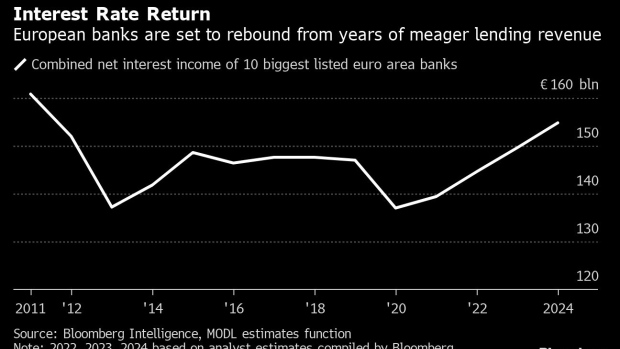Jul 20, 2022
Bank Relief From ECB Rate Hike Spoiled by Threat of Windfall Tax
, Bloomberg News

(Bloomberg) -- Europe’s banks waited more than a decade for higher interest rates to make lending more profitable again. Now some governments are threatening to spoil the party.
As the European Central Bank prepares to raise rates Thursday, politicians from Madrid to Warsaw are calling for mortgage holidays and bank taxes to shield consumers from higher borrowing costs and record inflation. Poland last week allowed home owners to suspend mortgage payments. Spain is mulling a 5% tax on bank fees and interest charges. Hungary already introduced a bank tax.
Tapping banks to help soften the impact of surging inflation is popular in a region long critical of the finance industry, particularly after many of them were bailed out with taxpayer money in the financial crisis. But for lenders already struggling with the fallout from sanctions against Russia, such moves could prolong a lost decade during which they had to cede market share to their larger Wall Street peers and struggled to make much-needed investments into technology.
“We need to share the burden of this crisis justly, and not like the last one, which fell on top of the most vulnerable,” Spanish Prime Minister Pedro Sanchez said last week as he unveiled his surprise tax.
Spain’s proposal, aimed at raising 3 billion euros ($3.1 billion) for measures to soften the impact of soaring inflation, wiped out about 6 billion euros in market value for the top five listed lenders on the day. The government has no plans to raise the corporate tax rate for banks and is instead leaning toward applying a VAT-style duty for service and interest charges, Bloomberg reported.
In Poland, where payments on floating-rate loans have skyrocketed to more than 6% from close to zero just last fall, the government is allowing mortgage borrowers to suspend as many as eight monthly payments through the end of 2023. The moratorium, which is expected to cost the industry 20 billion zloty ($4.3 billion), forced firms including BNP Paribas SA and Banco Santander SA to take more than 1 billion euros in financial hits so far.
The government measures come as the ECB, which sets interest rates for the countries that use the euro, is almost certain to raise interest rates on Thursday. Policy makers may even consider an increase of as much as half a percentage point, Bloomberg reported on Tuesday. If implemented, such a move would end negative rates that have prevailed since 2014.
European lenders have long blamed ultra-low and even negative rates for their lackluster profitability. Banks make money from the difference between the interest they pay on deposits and what they charge to lend them out. Low rates squeeze that margin. Higher rates, conversely, allow lenders to charge more for loans.
Higher interest rates set by the ECB would boost lending revenue at the region’s ten biggest banks by about 5 billion euros this year, analysts have estimated. Banks with a focus on floating rates such as Banco Santander and Banco Bilbao Vizcaya Argentaria SA will likely profit more quickly while deposit-heavy firms like Deutsche Bank AG will see the benefits more gradually.
Lenders in countries that already raised rates, such as Poland and Sweden, have seen their lending income grow substantially. But many governments view such a boost as an unfair windfall profit at a time when ordinary people struggle to cover the costs of their mortgages.
Europe’s banks “may well come under increasing taxation focus,” analysts at Goldman Sachs Group Inc. led by Chris Hallam wrote in reaction to the Spanish announcement. “Concerns that more countries could be added to the list” may make the sector less attractive for investors, they said.
©2022 Bloomberg L.P.





